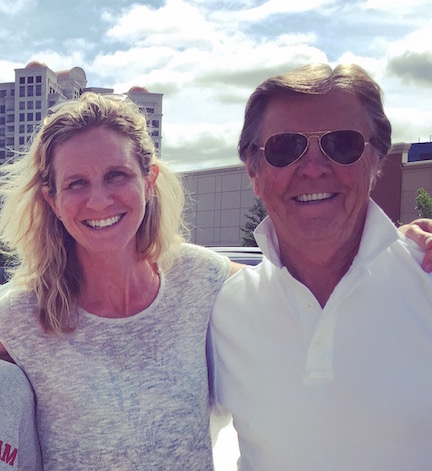Let me tell you about my Dad. I always thought he looked like Steve Austin, “The Six-Million Dollar Man.” Remember the show? He was the handsome pilot rescued from a plane crash and re-built with a bionic eye that was like a 20:1 zoom lens, one bionic arm, and two bionic legs. I was sure that my Dad had similar powers. I had a healthy fear of him, born from his ability to spot Bigfoot or me, up to no good. I hated it, but it was effective. “Don’t steal the quarters from my change jar,” he would say, and I would stare in disbelief. How did he know?
Then I was convinced that my Dad was a spy; he traveled for work for most of my childhood. He went to the airport in a dark suit and dark sunglasses, carrying only a briefcase. He would return in a few hours or in a few days. Sometimes, he parked his car in front of the terminal. Only spies did that.
I never saw my Dad just kicking it, the way some Dads do, in front of a Sunday football game on TV. My Dad was always in action mode and my brothers and I had no choice but to go along. We grew up on a lake, so my Dad built a sailboat with a friend. By the time I came along, he had traded up for a bigger boat and sailing was a regular weekend activity. This was the ‘70s, remember, so men and boys sailed, while women and girls made drinks. Eventually, I learned to sail. But mostly I preferred to sit on the bow and read while they coiled lines and worried about boat speed.
I’m sure we went out on nice, sunny days, but I only remember the slate-grey ones when a storm was brewing on the horizon. Dad would hoist the sails and steer the boat towards the darkest patches of water because “that’s where the wind is.” My eyes were glued to the horizon where lightning burned its way from sky to water and the clouds were as black and flat-bottomed as cast-iron skillets. My Dad would laugh and say, “Safety third!” then tell my brothers to unfurl the jib sail, while he waved happily to the confused captains motoring in the other direction, headed for the safe, warm harbor. And I? I was sent below to make Bloody Marys, catching bottles before they slid off the table and onto the floor. Here’s the thing: to my Dad, the storm was far away, and the lake was big. We could always choose a different heading. What was terrifying to me was exciting to him.
Another thing my Dad was never afraid of was hard work. When he was big enough to ride a bike, he got a job for the pharmacy making deliveries. In high school, he worked as a janitor after classes, mopping floors and scrubbing bathrooms. He was used to hard work and so hard work was expected of us. My brothers always had paper routes (which I usually did for them 🙂 and I worked at a dry cleaners every day after school. As a young man, my Dad tried channeling his work ethic into becoming a lumberjack, but it was no way to be a family man, so he learned sales and fell in love with the world of business.
This was where we rolled down different tracks. Dad was all about business, and I was all about books. When I graduated from university, a commencement speaker praised two words, “Love and Wisdom.” It was a long speech, and an academic one, in which he used the words love and wisdom over and over again as a refrain. I worried that my Dad might be so bored that he’d fall asleep. But when it was over, he gave me an energetic bear hug and said, “Did you hear him? There are two keys to success.” “Yes!” I said. And he quickly shot back, “Love and BUSINESS!”
And one New Year’s Eve, when my family was gathered together on a cozy night, I suggested we take a moment to reflect on the past year and write down our thoughts. My Dad immediately asked, “Fiscal year or calendar year?” I gave up and buried my head in Dickens’ Great Expectations.
It was not always smooth or easy being my father’s daughter. He had such high expectations of himself, that he passed them on to me, consciously or not. When he said, “You can do anything, run a company or a country.” I heard, “I won’t be pleased until you have the top office.” And so I tried. I worked hard to be the very best at every job I had, whether I was drying clothes, selling knives, or teaching high school. When I came home for the holidays, he would repeat, “Now, remember: you can be anything, run a company or a country.” And I grew angry towards him because he was so hard to please; it never seemed to be enough. For too long, I was staring at the dark clouds and hearing only thunder in his words. But all this time, he wasn’t talking about expectations, just possibility.
It was like that when we were out sailing, too. I looked at the horizon and saw dark, threatening clouds. But he looked at the horizon and saw this long, wide line of potential. I imagine that he thought, Why fixate on one small point where the worst is happening? Instead, he focused on the sunlight shimmering on the water just beyond that place and the plenty of non-threatening sky to the west.
So when this unexpected situation of my tumor arose and the doctors felt obligated to give us the darkest picture, it was hard for me to forget these cloudy places they described, as if they carried their own powerful electricity. But not my Dad. He looked at me and said, “Why dread what has not yet happened?” Then he got straight to work making up business slogans for my journey: “Strong as a Streetcar.” And “Just because it might rain, doesn’t mean it will.”
I watched him walk confidently towards this new horizon as if he were on bionic legs, and I knew I would follow him anywhere.
****

